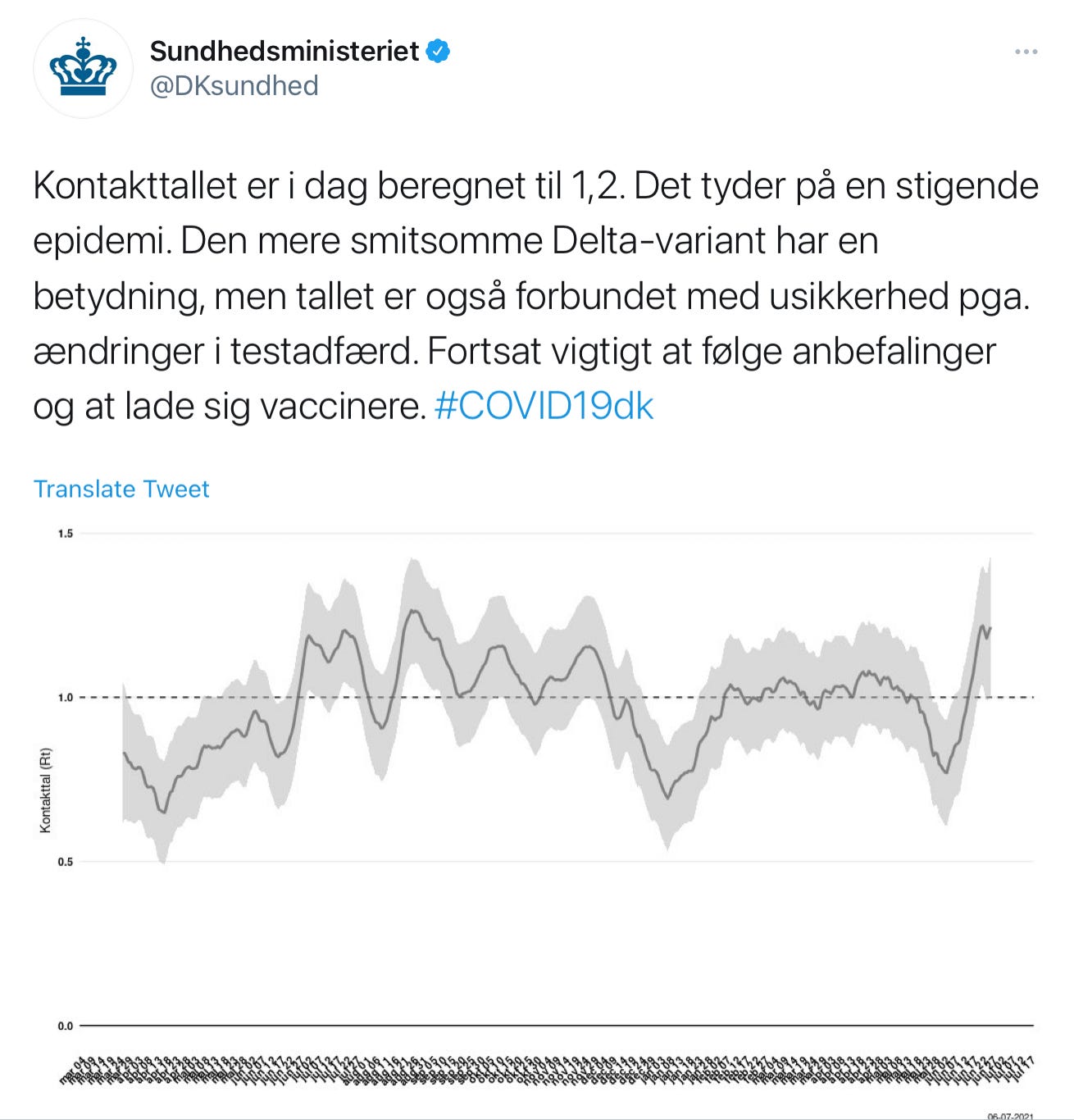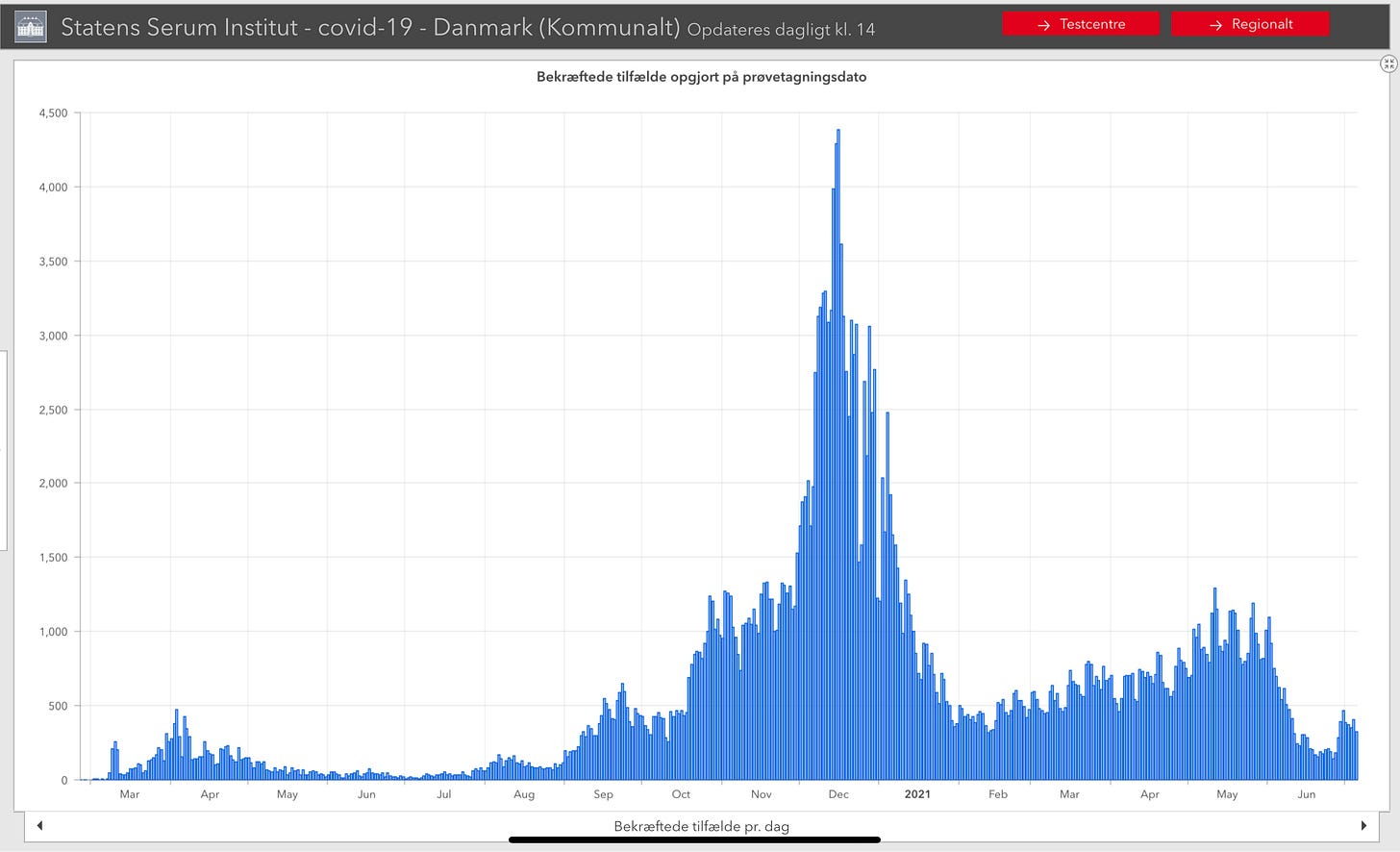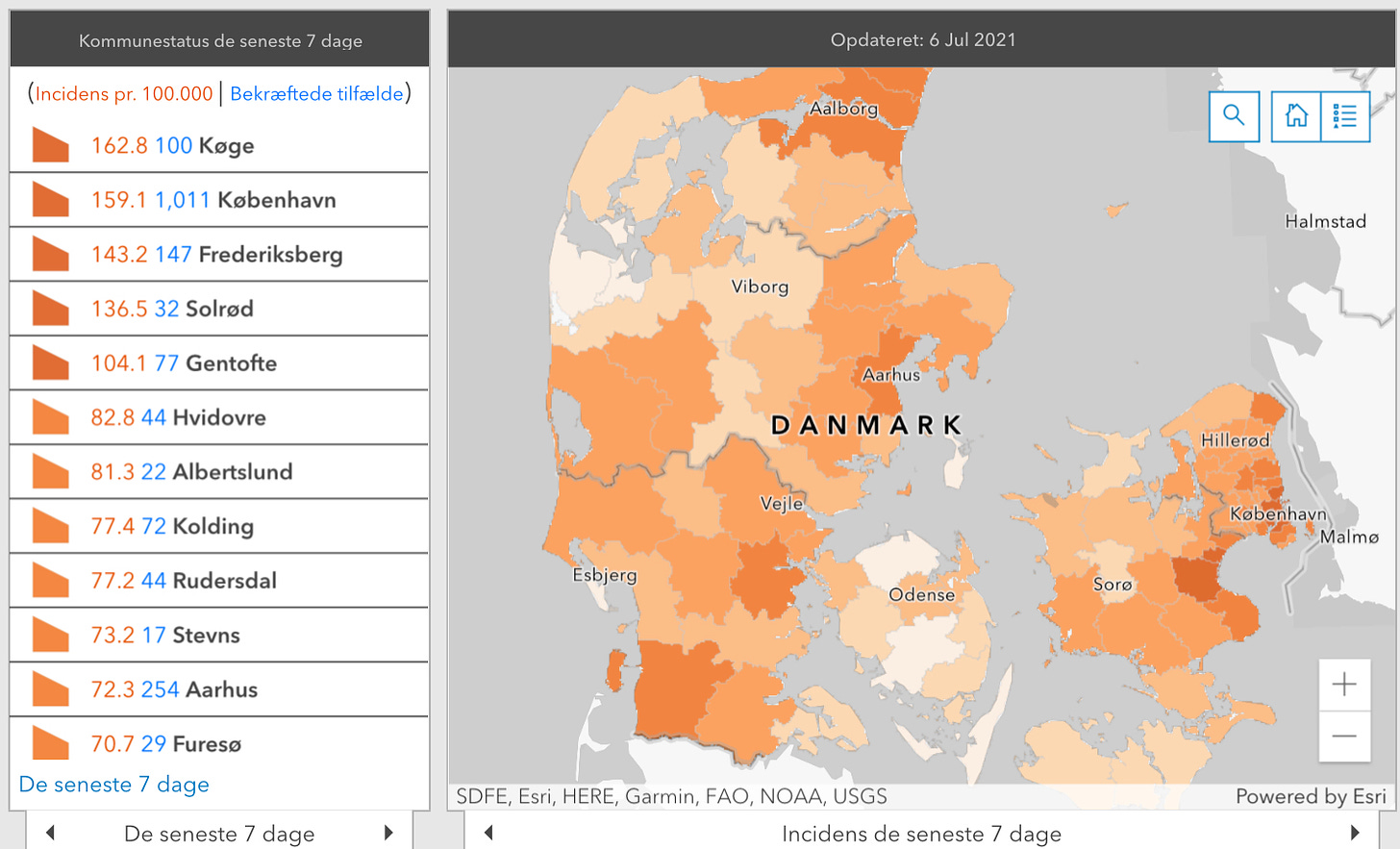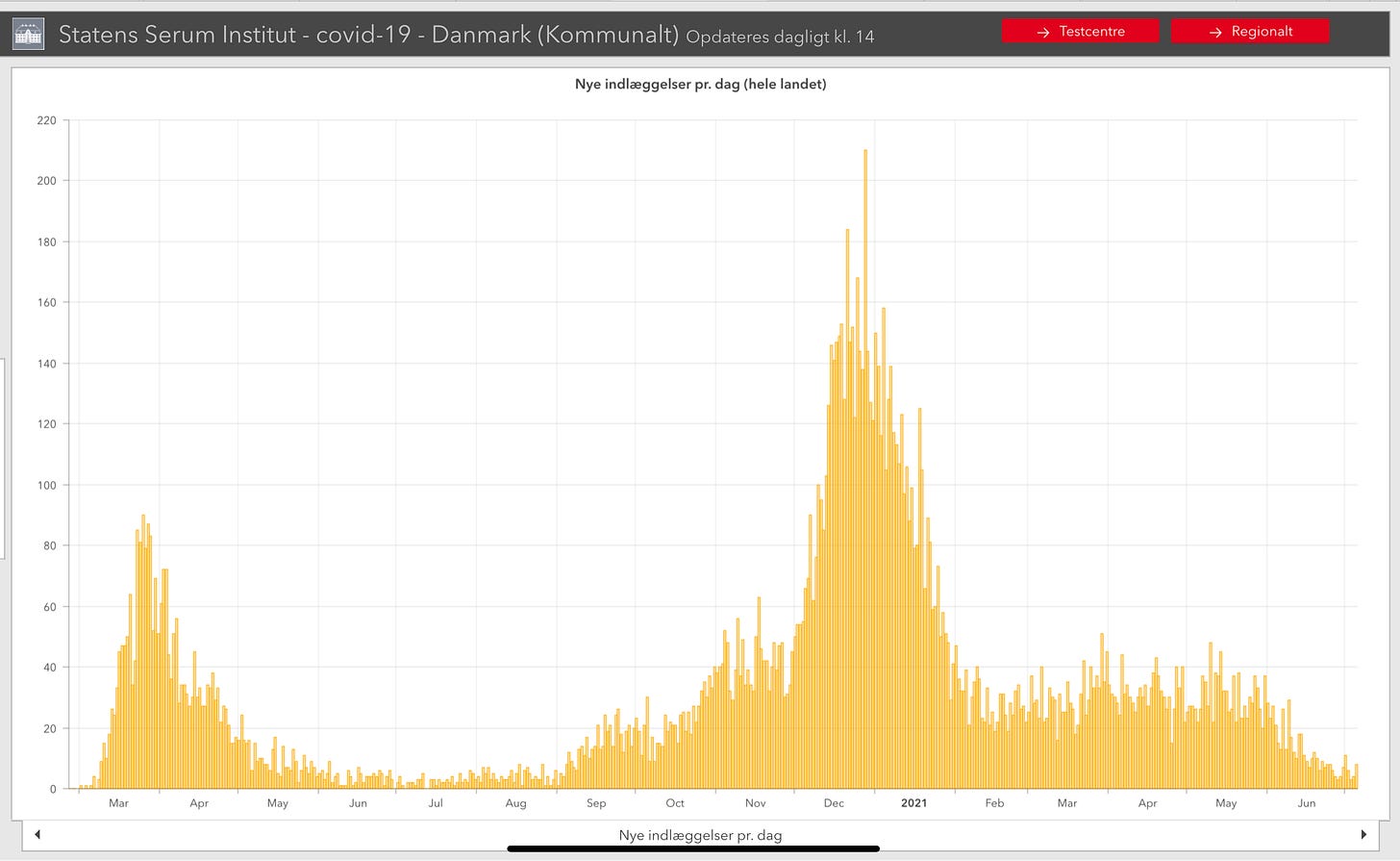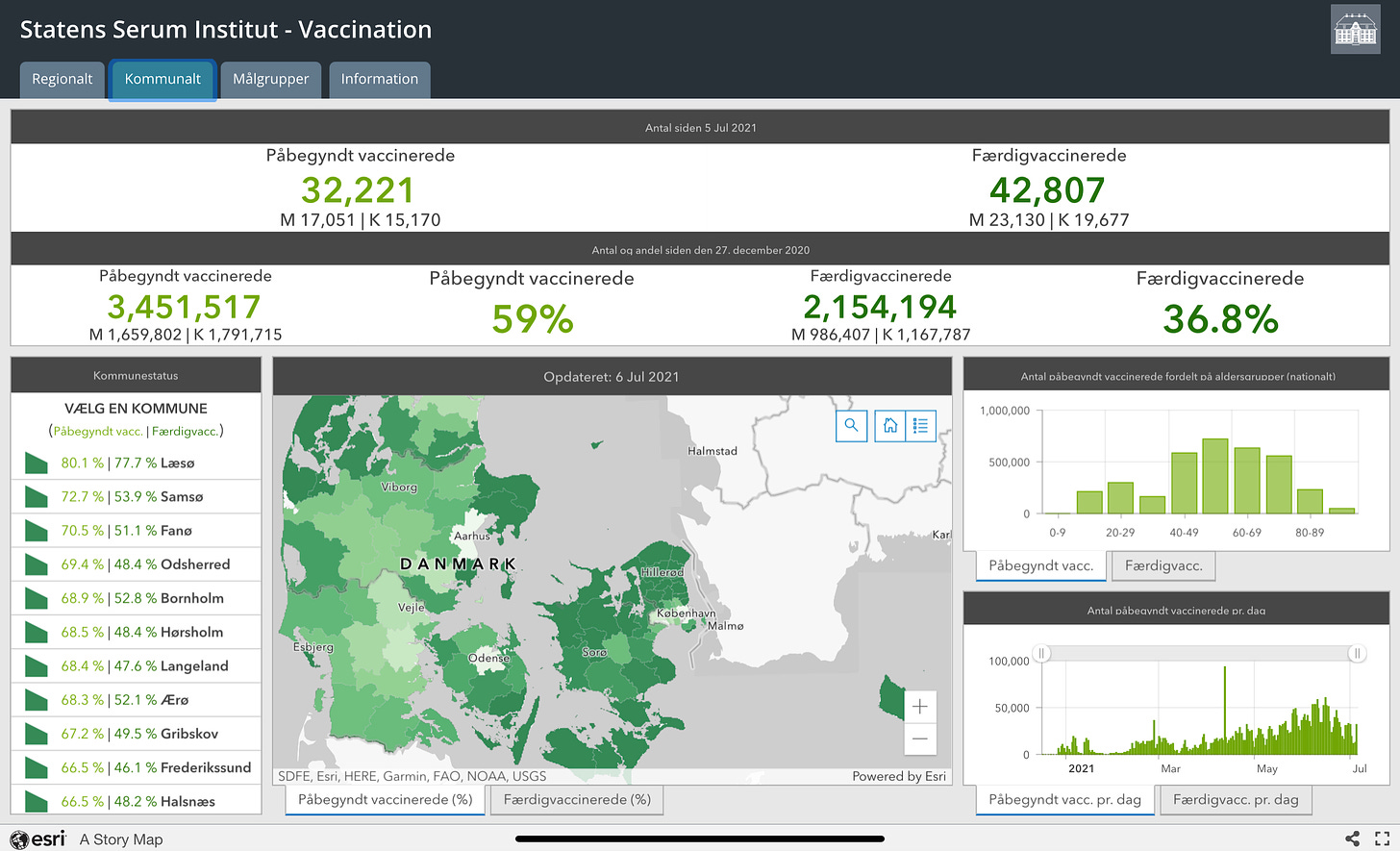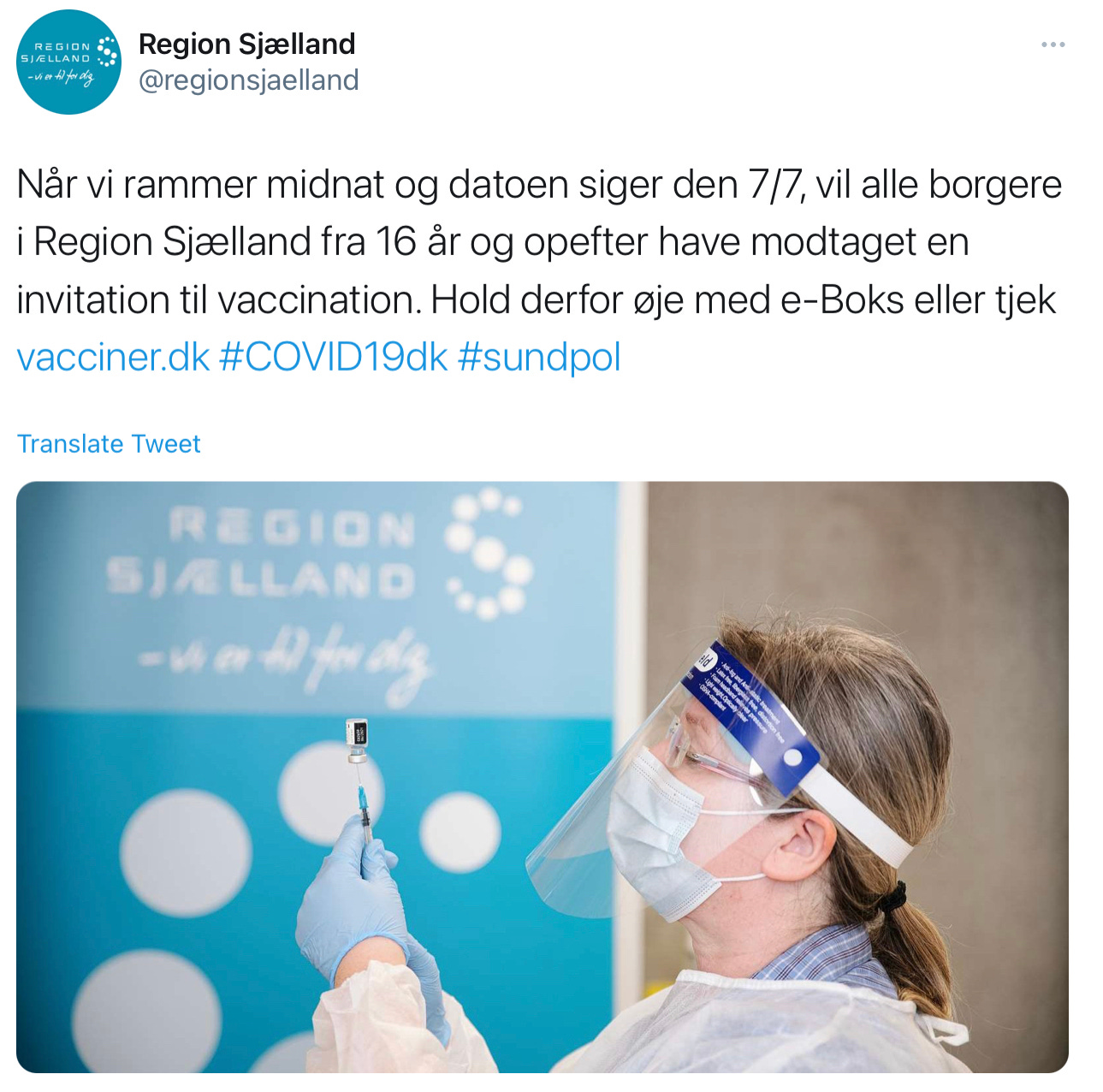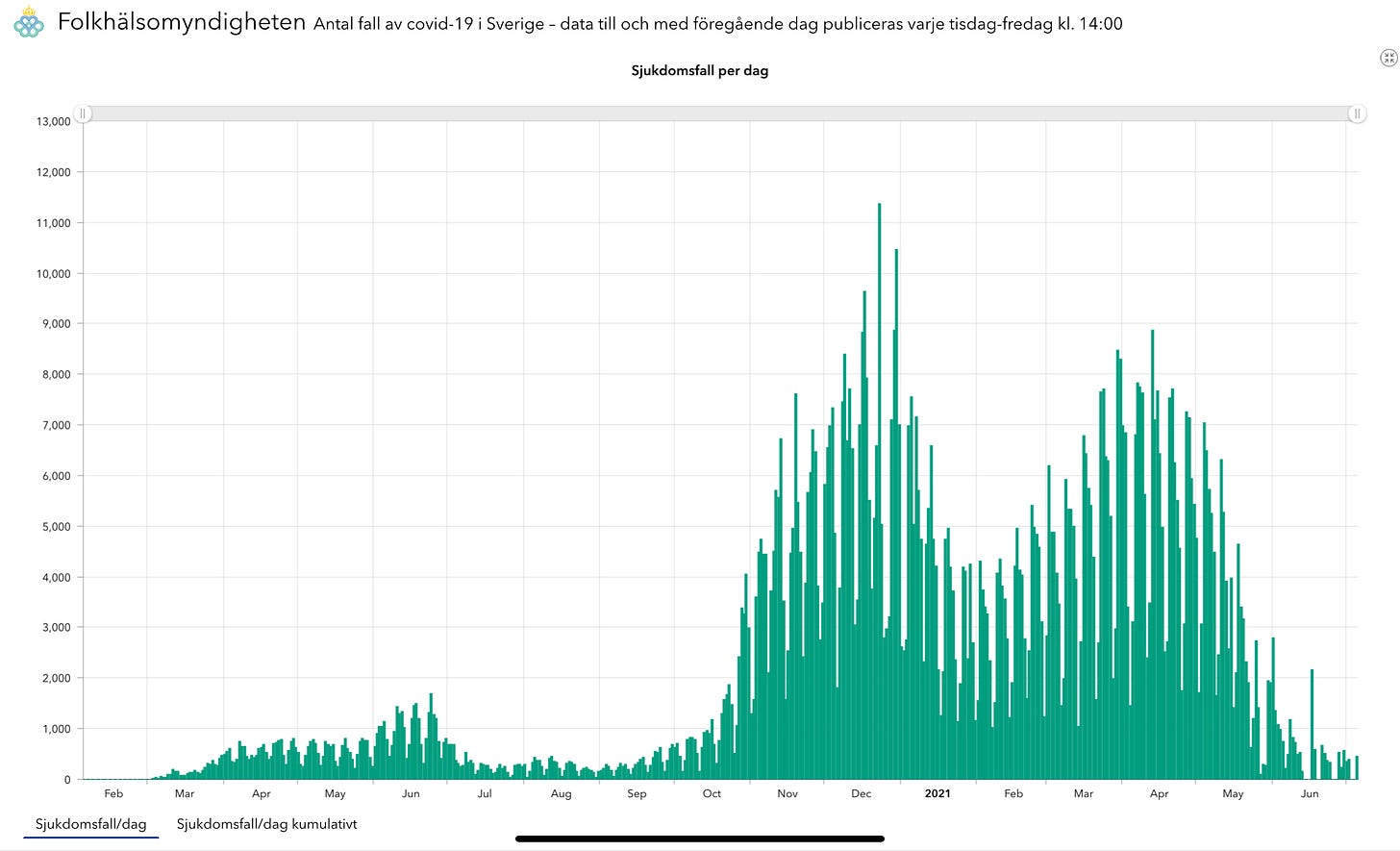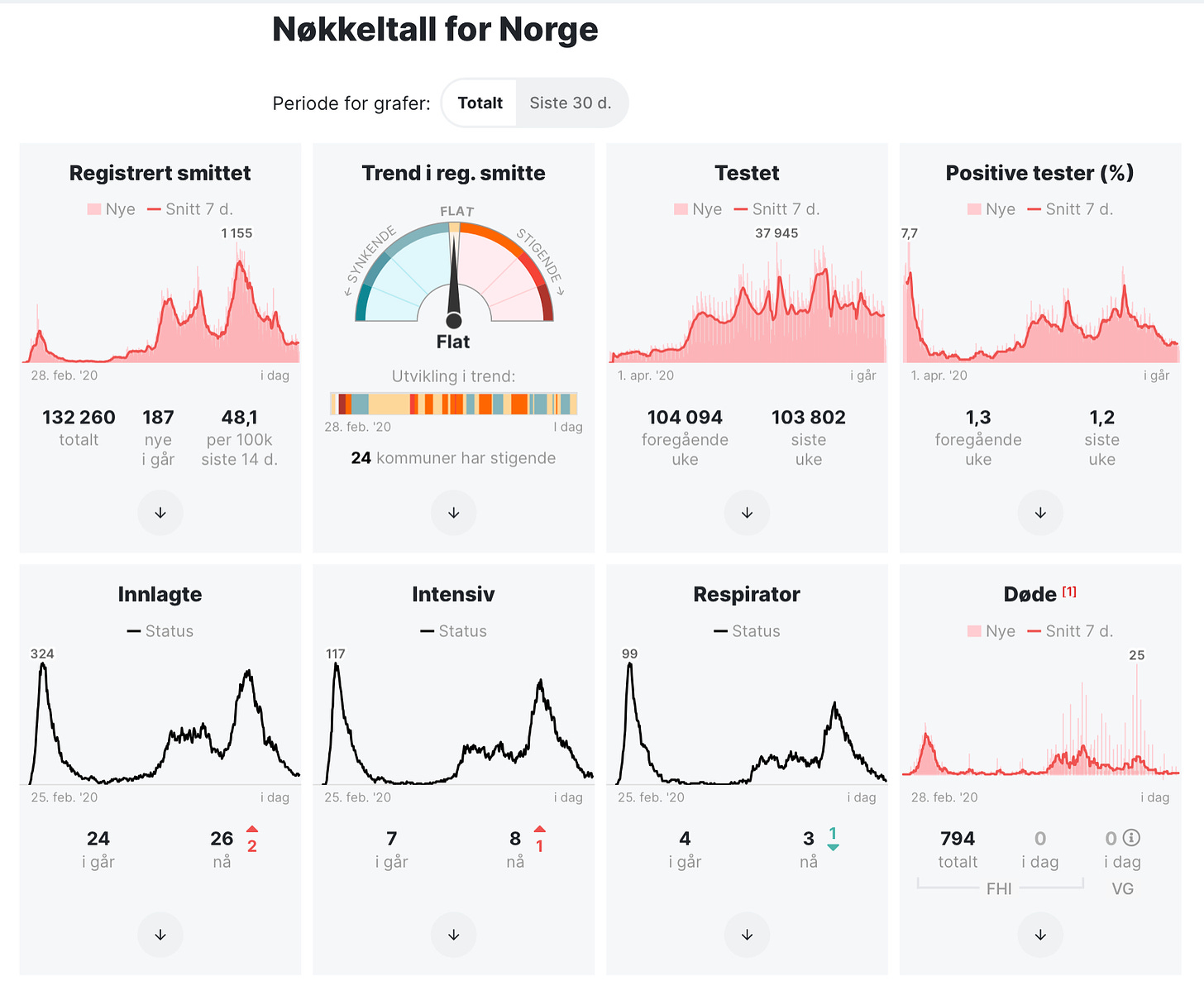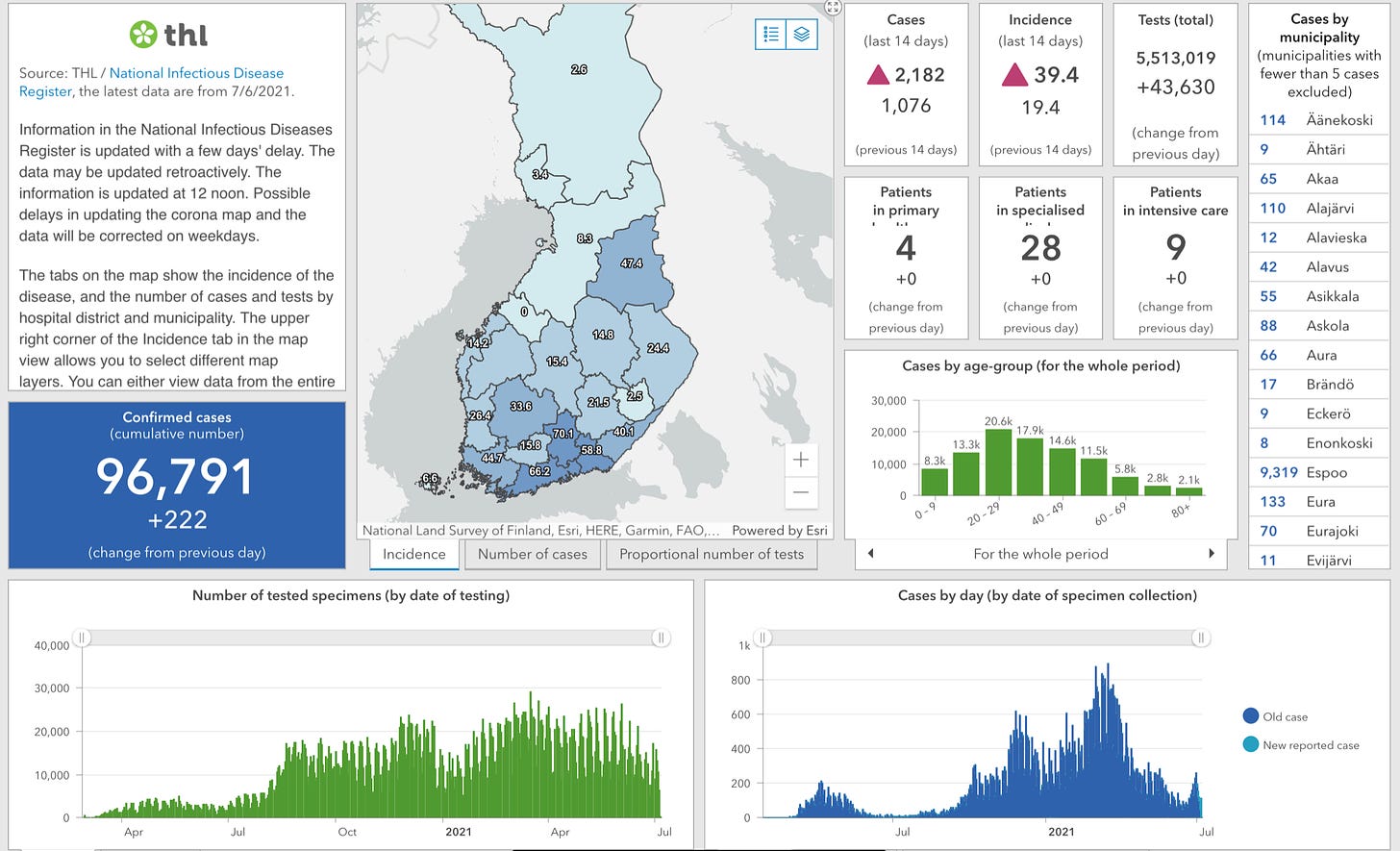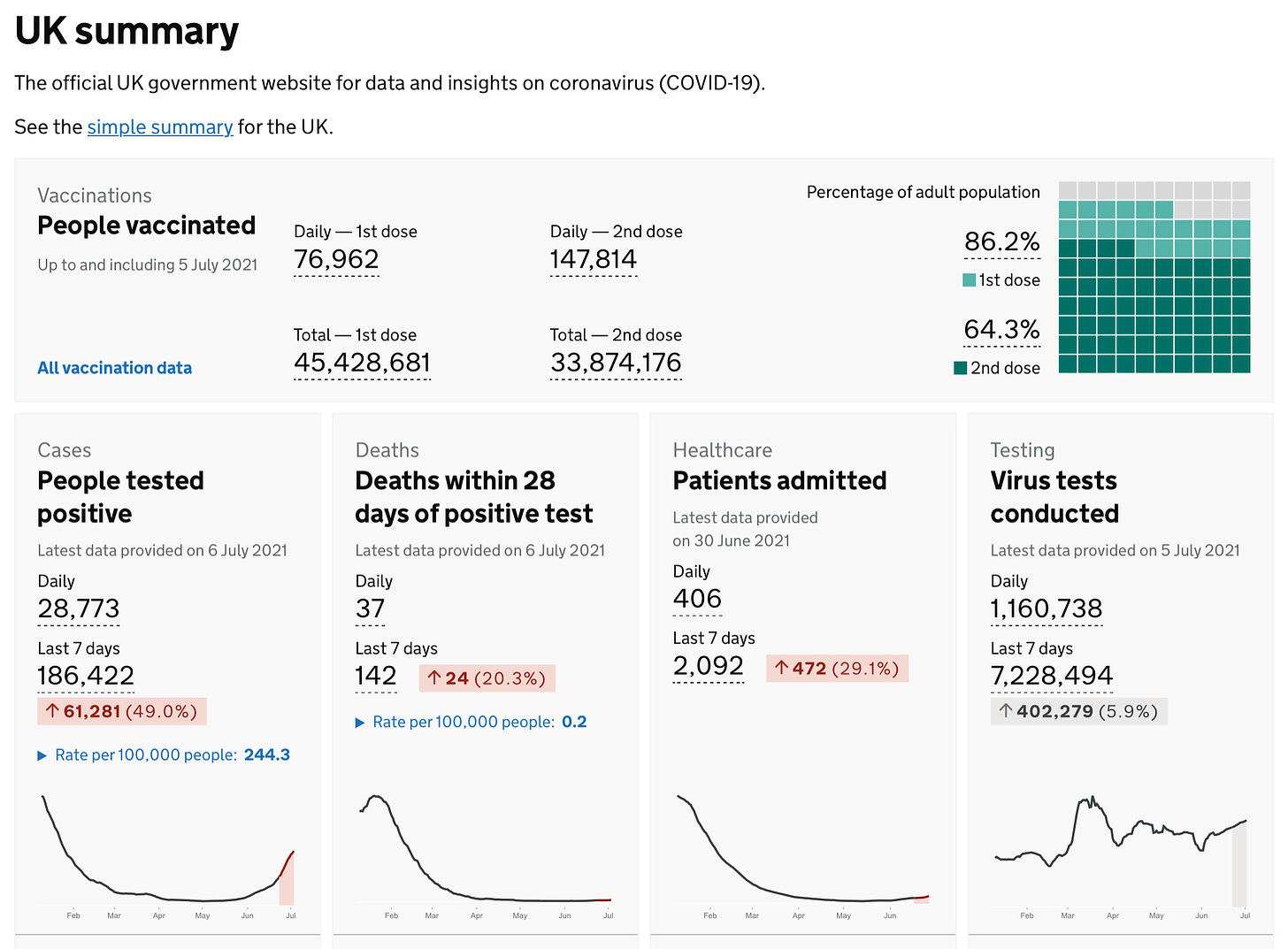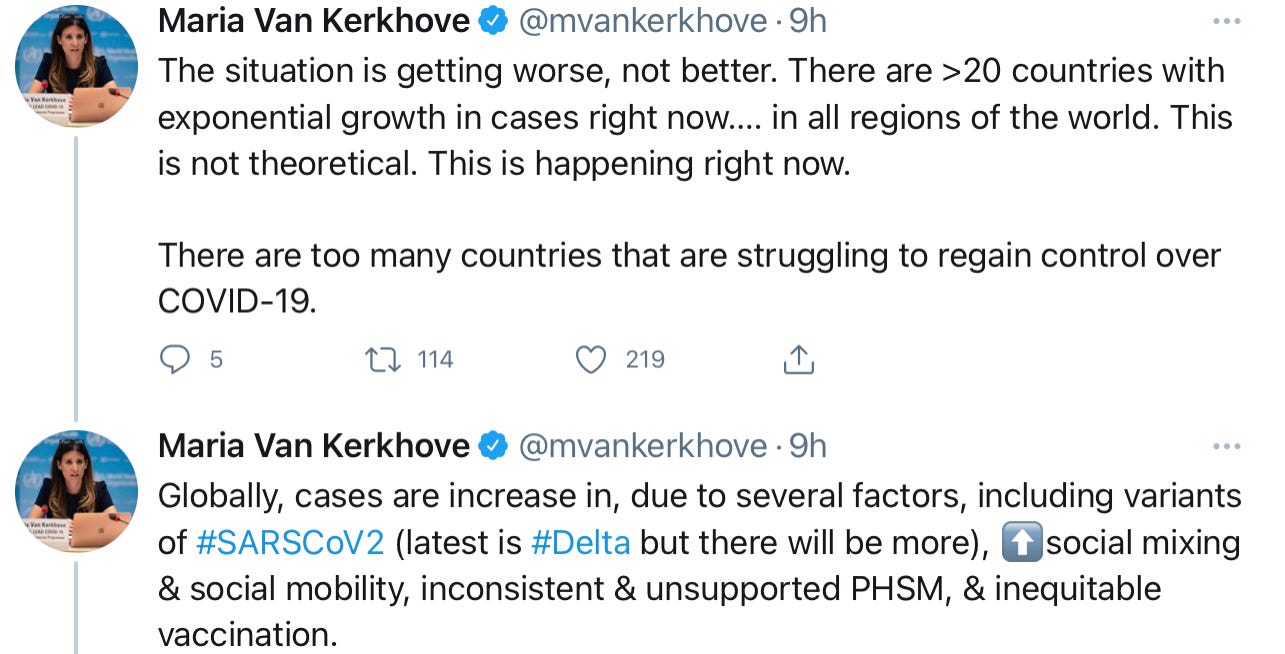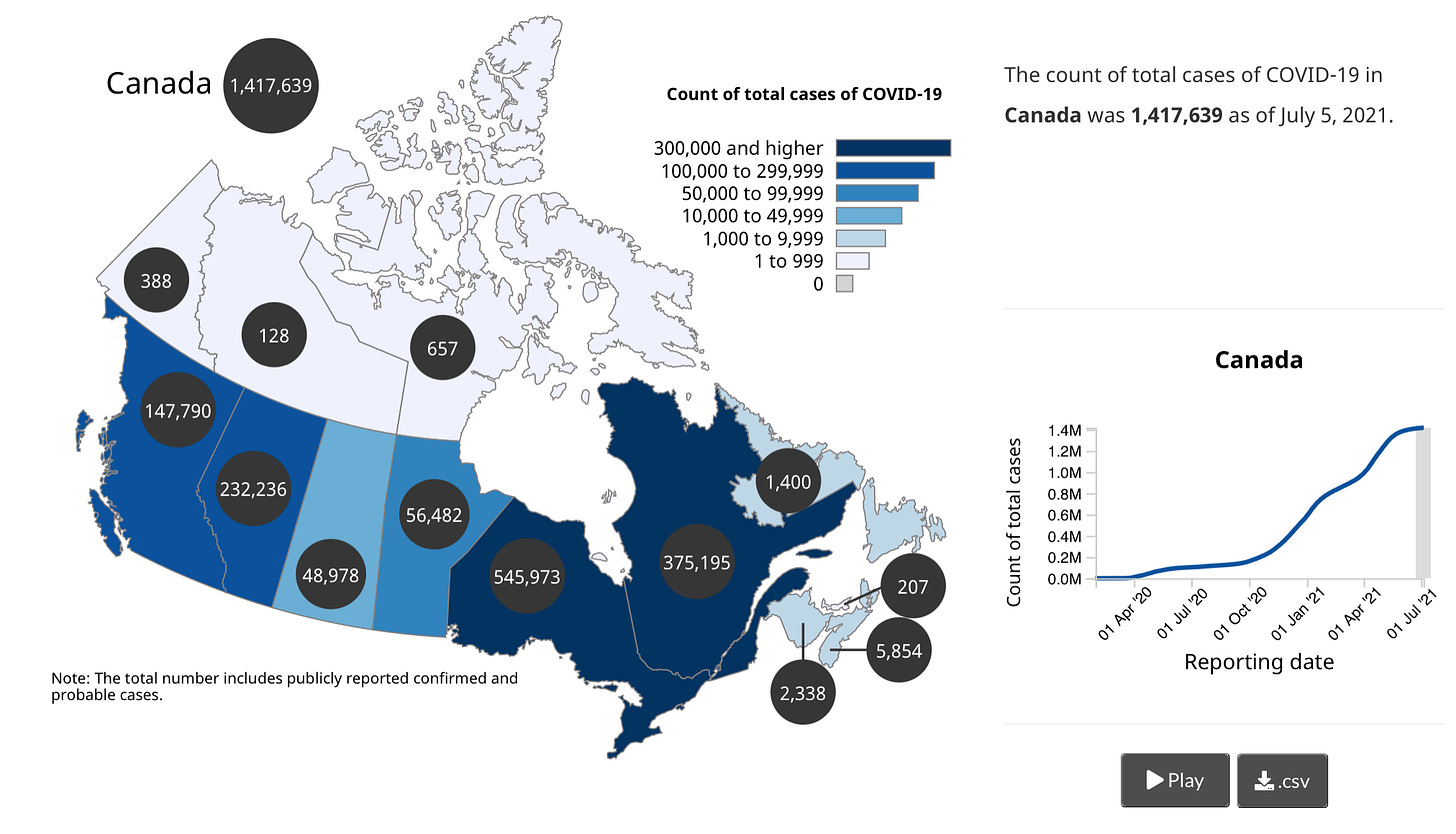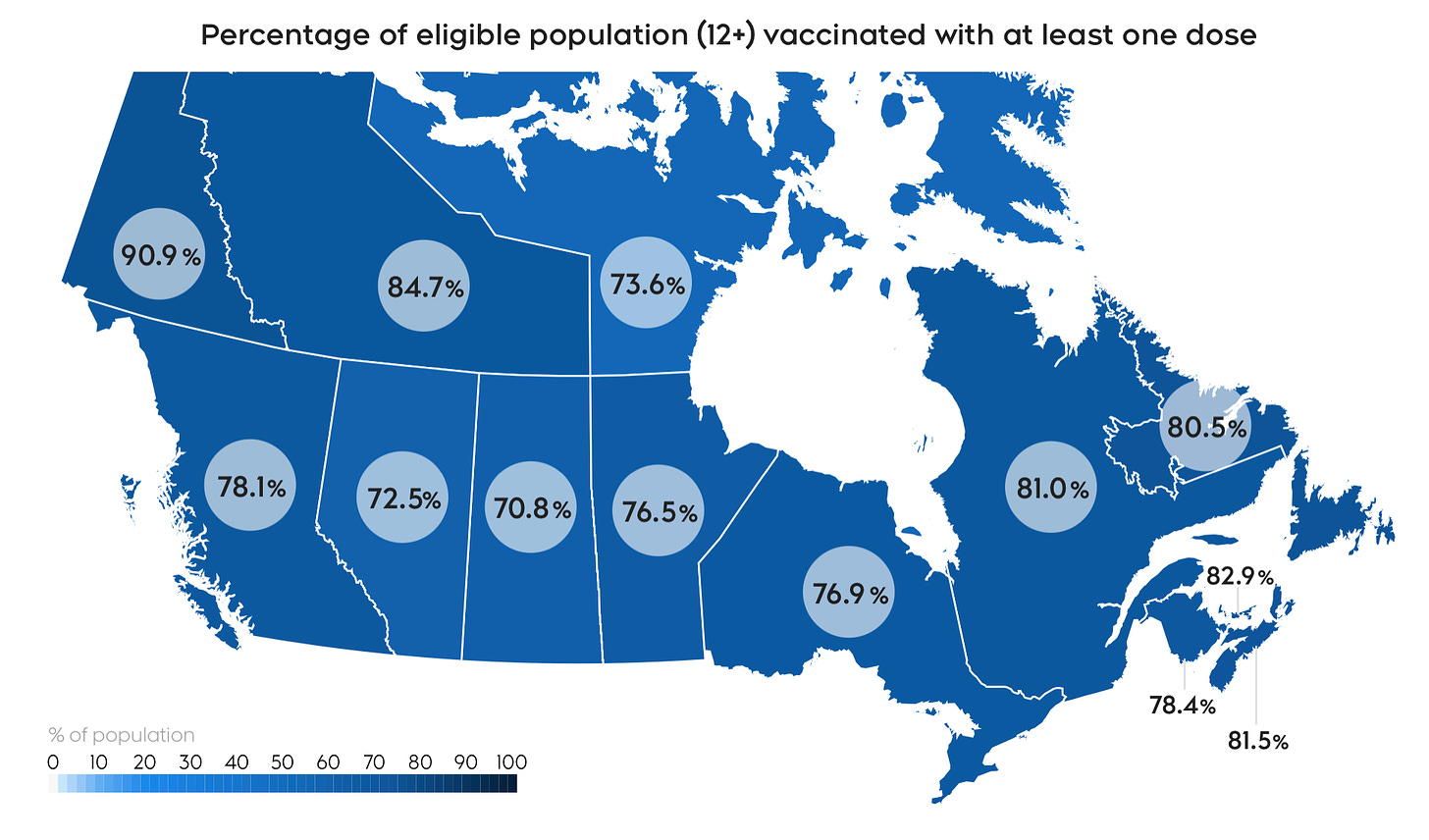🇩🇰
Denmark’s Health Ministry says we now have a “rising epidemic” as the COVID contact number (reinfection rate or R0) has jumped from 0.9 last week to 1.2 this week. The last time it was above 1.0 was the last week of May. The ministry says the Delta variant has had a significant impact as have “changes in test behavior.”
-
The Delta variant is now officially the dominant coronavirus strain in Denmark. The Staten Serum Institut says the variant accounts for more than two-thirds of all sequenced positive tests. The SSI says the Delta variant “is about twice as contagious” as the Alpha variant (B.1.1.7) and is spreading rapidly around the globe. The Institut cites the European Center for Disease Control in saying the rise of the Delta variant will “especially affect the unvaccinated, including children and young people, when the summer holidays end.” It is also expecting to see hospitalizations rise along with the variant spread “including among the fully vaccinated.” But, it adds, serious illness and death will be prevented by ever-increasing vaccinations, especially among those most vulnerable.
The Staten Serum Institut adds that we are entering a new phase with the Delta variant, where if will be “all-dominating” in Denmark in a short time. While a lot of major outbreaks have already been seen, the agency notes signs of community spread with no link to travel or any other specific outbreak. The SSI adds “an increasing number of cases are expected in the near future.”
Chair of the SARS-CoV-2 Variant Risk Assessment Group Professor Troels Lillebæk:
“No one can predict exactly where we will end up with the Delta and possibly other new variants, but we are much better equipped now than when COVID19 first hit us about a year and a half ago. It is encouraging that vaccines are being rolled out at a rapid pace and that they continue to have an effect against serious illness.”
The SSI is urging people to get vaccinated. For those not yet vaccinated, it advises taking every precaution, including getting tested regularly. It also advises people who haven’t yet done so to get the infection detection app Smitte|Stop.
-
Even as it is being eclipsed by the now-dominant Delta variant, we are still learning more about the Alpha strain. An updated study done by the Statens Serum Institut, Aalborg University, and the Danish COVID-19 Genom Consortium has been published in the scientific journal Lancet Infectious Diseases. The study confirms the Alpha strain first identified in the United Kingdom, has a greater risk of hospitalization. Studying the virus genome for over 50,000 infection cases in Denmark, the study found a 42% greater risk of hospitalization than other variants at the time.
SSI's Technical Director Tyra Grove Krause:
“The study clarifies how valuable Danish COVID19 data is in an international context, because we have a high test and sequencing rate and detailed health data. With the updated analyzes, the result is even more accurate. Fortunately, despite the fact that the Alpha variant would lead to more hospitalizations, we were able to prevent strain on the health care system in the spring by keeping overall infection numbers down in January.”
The study can be found on The Lancet HERE.
-
Denmark is reporting 542 COVID infections and one more coronavirus death in the last day.
Yesterday, there were 285,599 total corona tests done, 83,875 PCR and 201,724 rapid, for a (PCR only) positivity percentage of 0.79%.
Last week, there were no kommunes with COVID incidence rates per 100,000 residents above 100. This week we have five. All five are either in Metro Copenhagen or nearby to it.
The Danish Agency for Patient Safety says infections in Køge Kommune are increasing “especially among young people aged 15 to 25 years old.” The agency is ramping up coronavirus testing capacity in the municipality and urging people, especially those 15 to 25 years old, to get tested. It has also dispatched ambassadors to canvass the streets with information on the pandemic and testing.
-
COVID hospitalizations (43) have increased (+3) while the number of infected people in an ICU (8) has inched down (-1) and of those, the number of people on a ventilator (8) has edged upward (+1).
-
The Danish National Health Board has updated guidelines for close contacts of an infected person.
Close contacts:
Not fully vaccinated:
Immediately go into isolation.
Get a COVID test on days four and six after last contact.
Vaccinated or had a previous infection (within the last 12 months):
Isolation is not required
Get tested on days four and six after last contact.
People in proximity to a close contact of an infected person:
Not fully vaccinated:
isolation is not required
Get tested on days four and six after last contact
Vaccinated or had a previous infection (within 12 months):
Isolation is not required
Get tested on the fourth day after contact
If you have any questions or are in doubt you can call the Danish Agency for Patient Safety for advice at tel. 32 32 05 11
-
On the vaccination front to date, 3,451,517 1st-dose vaccinations (59% of the total population) have been administered while 2,254,194 people (36.8%) are now fully vaccinated.
Yesterday, there were 75,028 total vaccinations done.
If you live in Region Sjælland (area of the island outside Metro Copenhagen) it says vaccination invitations for all adults 16 years old and older will be uploaded by midnight tonight and begin to land in people’s e-Boks as of tomorrow.
-
In its latest weekly vaccination update, Region Syddanmark says it has 267,490 vaccine doses this week, more than double last week’s allotment. Once again this week, most of them are Pfizer/BioNTech doses. But from every week forward, it says it will receive not only more Pfizer doses than expected but also scaled-up Moderna deliveries. This means all remaining adults aged 16 years old and up - some 120,000 people - can as of today, book a vaccination appointment.
For adolescents aged 12 to 15 years old, the health authority expects invitations to be sent out beginning in week 29, the week after next.
The region says it has a busy summer ahead and both its vaccination centers and the booking website vacciner.dk will be under pressure. Especially with daily vaccination capacity in Southern Denmark doubling “in the coming weeks.” It advises people to look at several different vaccination centers, other than the one nearest them, to book a time to get a shot. The region also asks people to arrive on time and be patient if there are any line-ups.
So far in Region Syddanmark there have been 701,642 first dose vaccinations (57.3% of the region’s population) and 433,188 people (35.4%) have had both doses.
-
Region Midtjylland says it has about 146,000 vaccine doses this week, with a roughly equal split between Pfizer and Moderna doses. It says for anyone who has not yet begun the vaccination process to keep an eye on their e-Boks as invitations to book an appointment have gone out to the last group left: people aged 25 to 39 years old.
It advises people to show up a few minutes early for their appointment. They should not bring pets or kids. One companion maximum is allowed. The health authority also asks people to be well-hydrated and make sure to eat something before getting their shot. Anyone who is drunk or unruly will be turned away.
The region anticipates adolescents aged 12 to 15 years old to begin being vaccinated in week 29, the week of July 19.
🇸🇪
Sweden has added 850 infections and another two corona deaths since Friday’s update.
The Swedish Public Health Agency is STILL warning of a reporting lag due to a security update to its infectious disease database.
To date, 5,302,083 1st -dose (64.7% of the population) and 3,430,420 2nd vaccine doses (41.9%) have been administered.
-
Sveriges Radio is reporting that the Delta variant has become the dominant strain in several Swedish regions and is spreading rapidly across the country. With concerns about flagging efficacy of the Pfizer vaccine against the variant according to data out of Israel, Sweden's vaccine coordinator Richard Bergström says updated vaccines are coming this fall.
-
Region Stockholm has seen 394 infections between June 29 and July 5 while seeing two more virus deaths. 34 infected people are in hospitals in the region.
Chief Physician Elda Sparrelid:
“Even though we are now slowly seeing a reduced number of patients with COVID19 who need hospital care, the infection remains. Developments in, for example, England, Portugal, Spain and Cyprus show that it can quickly turn upwards again, despite summer and fine weather. It is basically about how we live and follow advice and recommendations. As soon as we believe that the infection is over and no longer take precautions then the risk of infection spreading increases again.”
Sparrelid warns that it is imperative to delay any new infection wave to buy time to vaccinate as many as possible, especially with the Delta variant growing. She notes that infections in the region have increased week to week, saying it is a worrying sign.
The region has identified 350 confirmed Delta variant infections so far, but sequencing results are backlogged from several weeks ago.
🇳🇴
Norway has added 187 infections and had no new virus deaths since yesterday’s update.
COVID hospitalizations (26) are up (+2) ICU numbers (8) have edged upward (+1) and of those ventilator numbers (3) have inched down (-1).
To date, 52.75% of Norwegians have had one dose and 29.10% have had both.
-
Norway has delayed its final phase of reopening due to concerns over the Delta variant. Yesterday, Prime Minister Erna Solberg announced the lifting of some restrictions, but those were scaled back from what was initially planned.
"There is a risk that the Delta variant will cause a fourth wave of infection in the unvaccinated part of the population among those who have only received one dose or are in vulnerable groups.”
Caps on gatherings in private homes, limiting gatherings to a maximum of 20 people, will remain in place. Restrictions on bars, restaurants, and adult recreational sports will also stay in place.
Limits on indoor and outdoor events have been eased, with infection-control measures remaining in place, including testing, and corona passport requirements. Quarantine free travel between Norway and countries like France, Croatia, and Italy is also now permitted.
The Norwegian Public Health Institute has said the Delta variant will likely become the dominant strain in Norway this summer.
-
Norway will likely vaccinate 16-and 17-year olds based on the recommendation of the Norwegian Institute for Public Health. A final decision will be made this September and, if approved, the age group will begin vaccinations when everyone over the age of 18 has been inoculated.
Chief Physician Margrethe Greve-Isdahl
“There are few young people who have become seriously ill from the coronavirus, but there is more infection among 16-17-year-olds than in younger adolescents and children. Vaccination is therefore important to protect against serious illness in those who may develop it. In addition, vaccination will prevent the spread of infection in the age group, and could contribute to population immunity. This is necessary in order to ease restrictions that have been particularly burdensome for young people during the pandemic.”
21% of Norway’s population are under the age of 18, making the chances of reaching herd immunity extremely difficult without some vaccinations among young people. Norway’s health agency says if the plan gets the go ahead, vaccinations for 16-and 17-year olds would begin in October.
-
The Norwegian Institute for Public Health has tabled the preliminary results of a report assessing the efficacy of COVID restrictions among the country’s immigrant population. It found the while the measures worked as intended, they weren’t enough to remove the overrepresentation of infection statistics among that group.
During the pandemic, Norway’s immigrant population was more likely to get the coronavirus and to become hospitalized. The report finds complex reasons for that, including socialization and travel habits, infection tracing delays, communication challenges, and differences in social-economic conditions.
The goal of the report is to identify issues in integrating immigrant populations through the lens of a pandemic. The full report is due this fall.
🇫🇮
Finland has registered 222 infections since yesterday’s update.
COVID hospitalizations and fatalities are updated on Wednesdays.
To date, 3,376,415 1st-dose vaccinations (60.5% of the population) have been administered while 1,162,583 people (20.9%) are fully vaccinated.
-
Finland has eased some travel restrictions and clarified others. Anyone who has proof of being either fully vaccinated or having had a recent previous infection can travel to Finland without having a mandated COVID test. The rules also open the door to travelers from countries designated as low-risk to travel to Finland without the needing a test.
Currently, the countries considered to be low-risk by Finland are Australia, Hong Kong, Iceland, Israel, China, Macao, Malta, Poland, San Marino, Singapore, New Zealand, and the Vatican. Travelers arriving into Finland from the Norwegian municipalities of Storfjord, Kåfjord, Nordreisa, Kautokeino, Karasjok, Tana, Nesseby and Sør-Varanger are also included in the list.
This list can change depending on each countries infection situation.
The new travel rules come into force on Monday, July 12.
🇬🇧
The Delta variant continues to push infections up in the United Kingdom, with another 28,773 reported today, the highest number of daily infections since January, while another 37 lives were lost. Over the last week, infections, deaths, and hospitalizations continue to increase.
The British government announced it is lifting a lot of restrictions, including scrapping laws mandating face mask use and social distancing, by July 19. It also lifted requirements for fully vaccinated people to isolate after contact with an infected person.
Health Secretary Sajid Javid says Brits now must learn to live with COVID, adding by the time restrictions are lifted there could be 50,000 COVID cases a day — double current rates — and that cases "could go as high as 100,000.
🇮🇱
Mixed news on the Pfizer/BioNTech vaccine out of Israel. The Israeli Health Ministry released data this week saying the vaccine’s efficacy against the Delta variant has dropped to 64%. In May, when the variant was less widespread, the data showed an efficacy of 94.3%. The good news, though, is that the same data shows the Pfizer vaccine is 98.2% effective at preventing serious disease, hospitalization, and death.
Israel’s health ministry is now launching urgent studies on different aspects of whether if there is a need for a third booster shot.
Infections continue to increase in Israel, with 427 reported today. Hospitalizations are also rising.
🌎
Globally, infections are going upward again, even as the total to-date pandemic death toll around the world passes four-million lives lost.
Epidemiologist and COVID Technical Lead at the World Health Organization, Maria Van Kerkhove, warned today the pandemic is far from over.
🇨🇦
Canada's next Governor General is Mary Simon. Officially announced by Prime Minister Justin Trudeau, Simon is the first indigenous person to hold the position. She is also a former Ambassador to Denmark.
-
Canada reported 381 infections yesterday while suffering eight more coronavirus deaths.
The Canadian vaccination effort has so far administered 25,940,684 1st vaccination doses (68.13% of the population) while 13,750,442 people (36.12%) are now fully vaccinated.
In Ontario today 244 infections and another nine deaths. The vaccination effort in Ontario has slowed to a crawl, with less than a quarter-percent increase in first-dose vaccinations over the last 24 hours. Vaccinations charged to 78% coverage for first doses and seems to have hit a wall.
Quebec reported 67 new infections and no deaths.
In Atlantic Canada, Nova Scotia reported seven new cases. There were no new infections in Newfoundland and Labrador and in New Brunswick.
Manitoba saw 65 infections and one more death yesterday.
There were 20 corona cases and no new deaths in Saskatchewan yesterday.
Alberta recorded 139 infections and two more fatalities yesterday.
B.C. registered 87 new virus infections and three more deaths.




